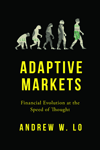Book review: Adaptive Markets
Book review: Adaptive Markets, by Andrew Lo Lo attempts to show how both rationality and irrationality exist in financial markets at the same time.

Get the latest financial news, insights and expert analysis from our award-winning MoneyWeek team, to help you understand what really matters when it comes to your finances.
You are now subscribed
Your newsletter sign-up was successful
Want to add more newsletters?

One of the big ongoing debates in finance and economics is the extent to which financial markets are driven by logic and rationality, as opposed to emotion and caprice. The "efficient markets hypothesis" the theory that financial markets always perfectly reflect all available information has been badly mauled by both the bursting of the dotcom bubble in the early 2000s, followed by the great financial crisis. Yet many economists remain loath to abandon the idea entirely. This new book from Andrew Lo, professor of finance at MIT, attempts to show how elements of both rationality and irrationality can exist in financial markets at the same time as each other.
Lo claims that the "wisdom of crowds" can work very well on occasions, but that the results can be skewed by various behavioural quirks. One example of those is loss aversion. It's well known that most people prefer an investment with a small guaranteedgain to a riskier one with the chance of a loss, even if the latter offers a higher expected overall return. However, what is less well known is that people prefer to accept a mathematically worse outcome, with a higher potential downside, provided it has a lower chance of making a loss. Loss aversion leads many ordinary and even some more experienced investors to prematurely cash in winning investments while sticking with losers.
Try 6 free issues of MoneyWeek today
Get unparalleled financial insight, analysis and expert opinion you can profit from.

Sign up to Money Morning
Don't miss the latest investment and personal finances news, market analysis, plus money-saving tips with our free twice-daily newsletter
Don't miss the latest investment and personal finances news, market analysis, plus money-saving tips with our free twice-daily newsletter
Lo draws on a great deal of academic research, as well as practical experience running a quantitative hedge fund, to argue that these quirks are due to the way that our brains have evolved over thousands of years. Feeling and intuition can provide useful cognitive shortcuts hence the fact that those with brain damage in the part of the brain dealing with emotions have problems prioritising tasks and making decisions. However, far more people have the opposite difficulty in that they rely too much on their gut, as opposed to logic, when solving problems.
Lo isn't the first writer to examine this area, but he provides a lot more detail than his contemporaries and has a knack for providing a telling anecdote or story to illustrate his point. More important, he also avoids being condescending or triumphalist, and is honest enough to admit that there may be alternative explanations for what he has observed.
What the press said
Adaptive Markets "is dazzling in both its erudition and its charm", says John Authers in the FT, who predicts that it "will join the financial texts that have come to symbolise schools of thought in the public mind". However, it is less clear "whether [Lo] has produced a theory clear and potent enough to satisfy his demanding primary audience of academic economists, or to provide a useful road map for investors".
Get the latest financial news, insights and expert analysis from our award-winning MoneyWeek team, to help you understand what really matters when it comes to your finances.

-
 Student loans debate: should you fund your child through university?
Student loans debate: should you fund your child through university?Graduates are complaining about their levels of student debt so should wealthy parents be helping them avoid student loans?
-
 Review: Pierre & Vacances – affordable luxury in iconic Flaine
Review: Pierre & Vacances – affordable luxury in iconic FlaineSnow-sure and steeped in rich architectural heritage, Flaine is a unique ski resort which offers something for all of the family.